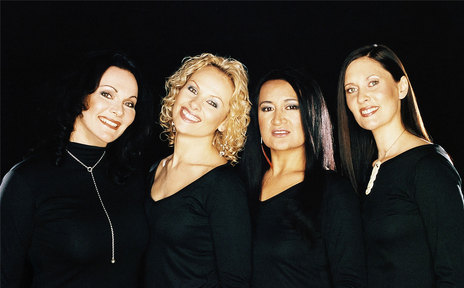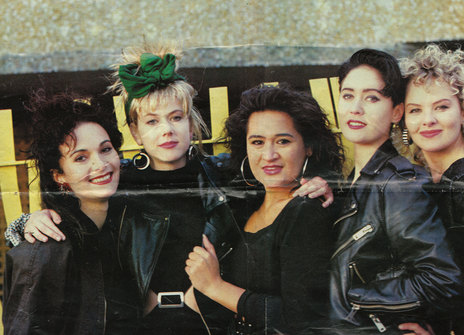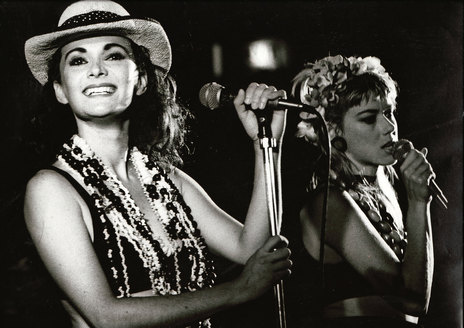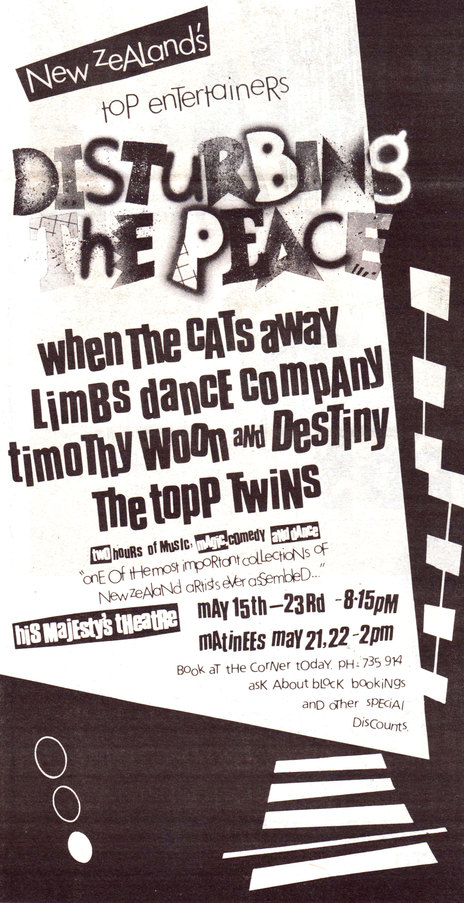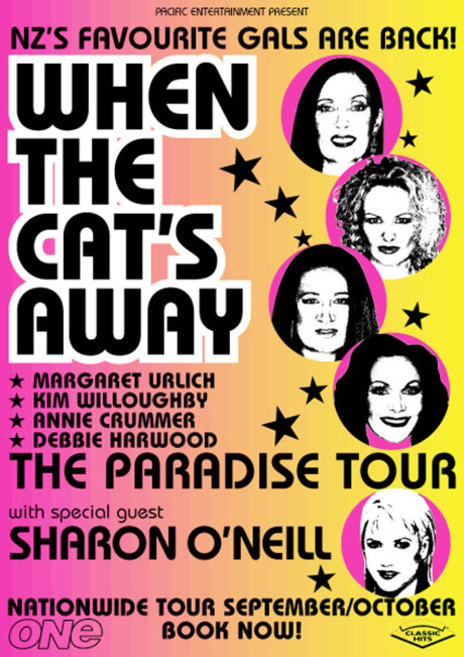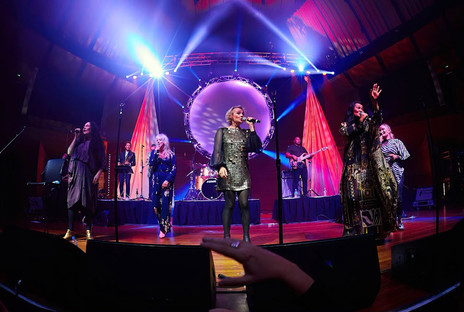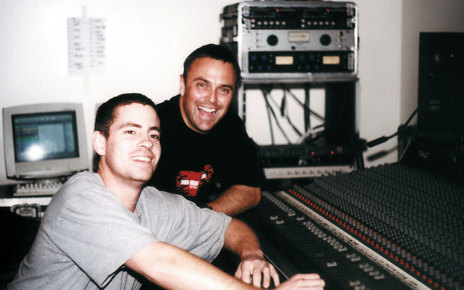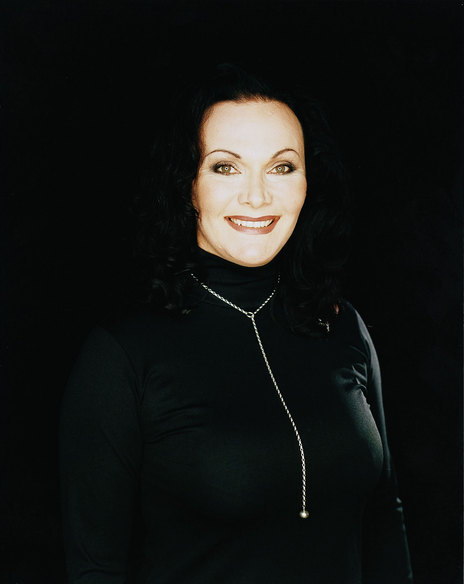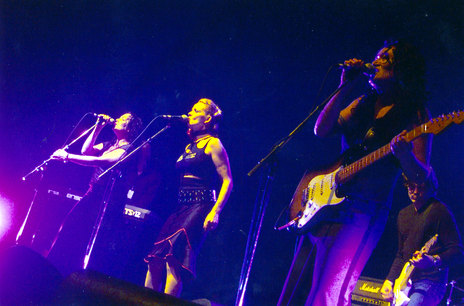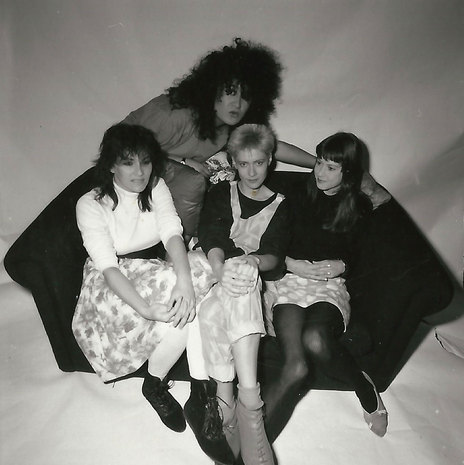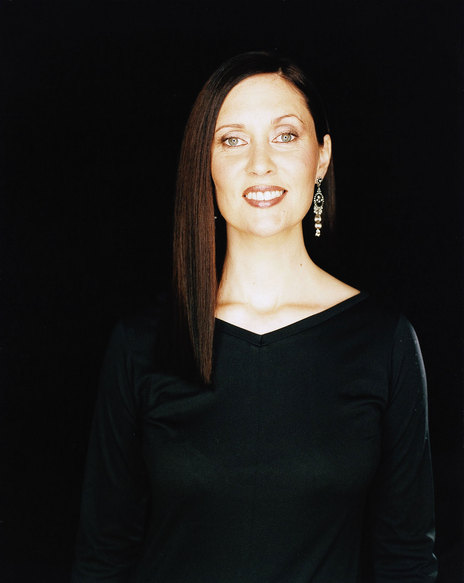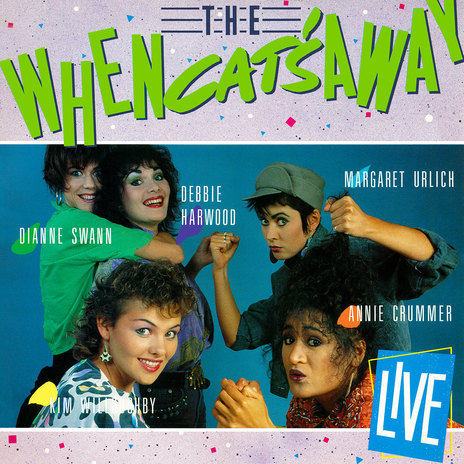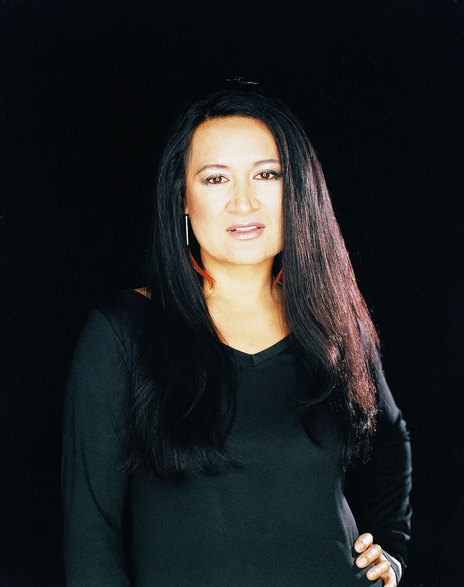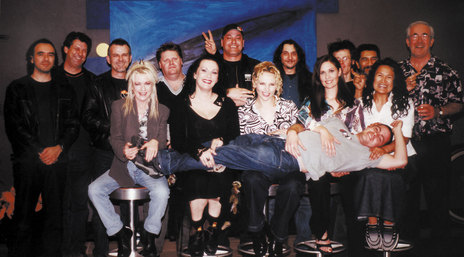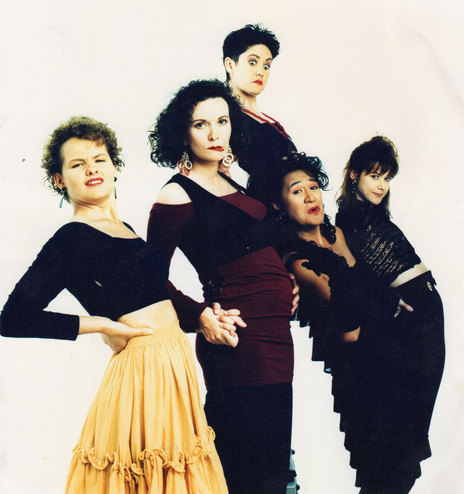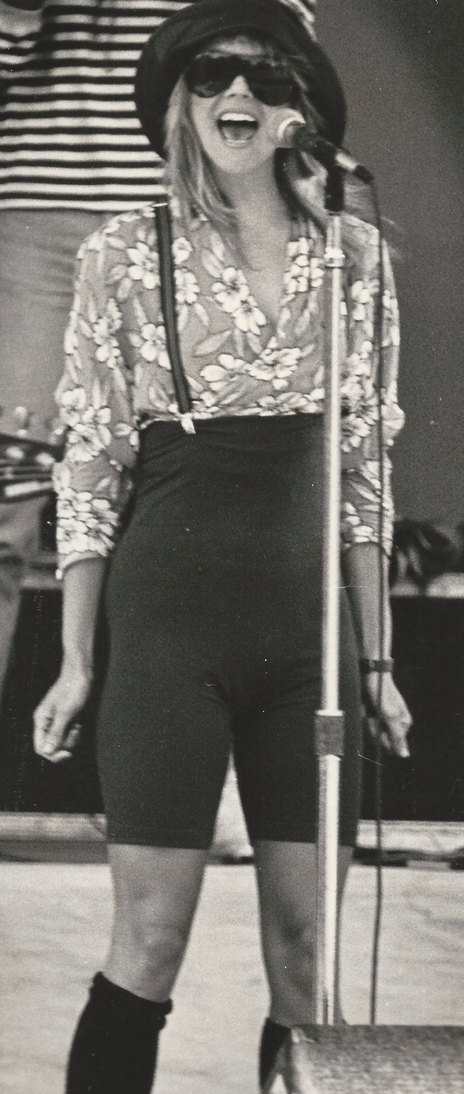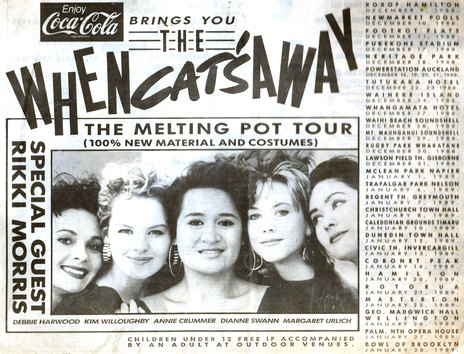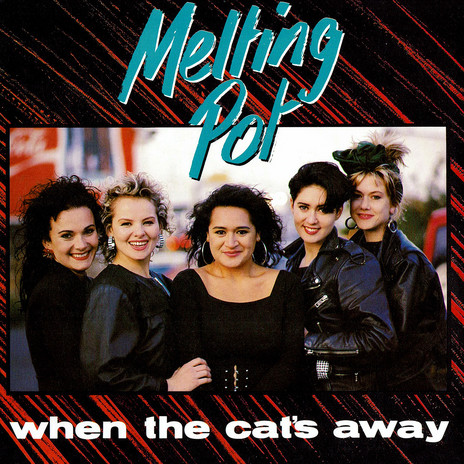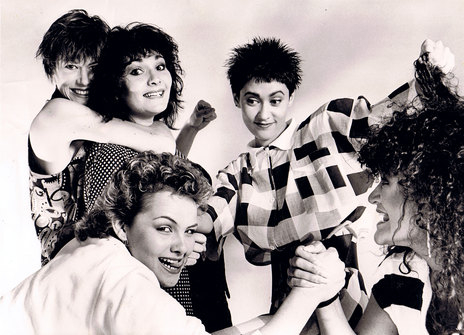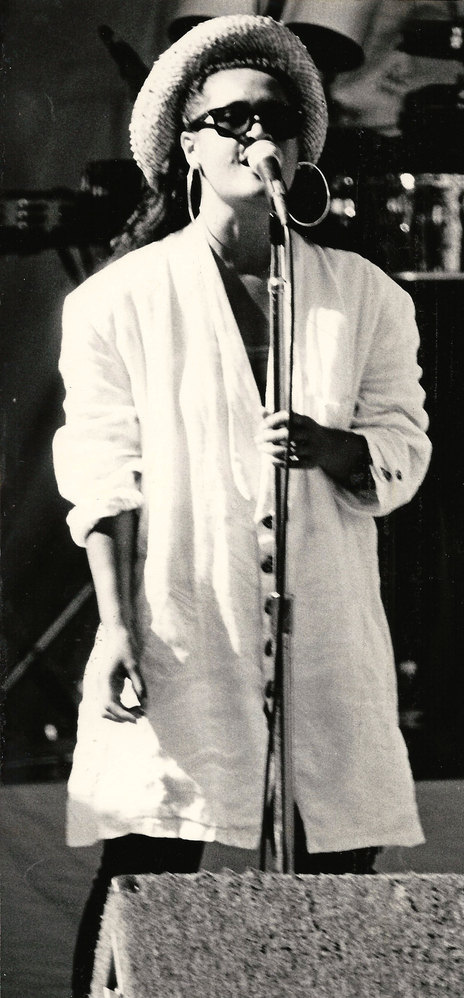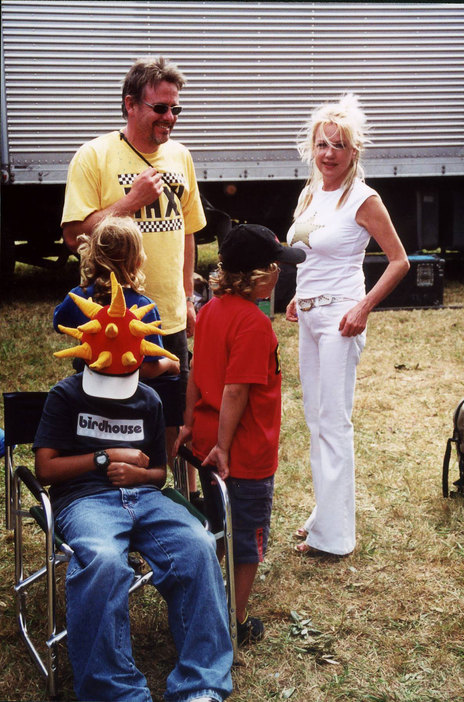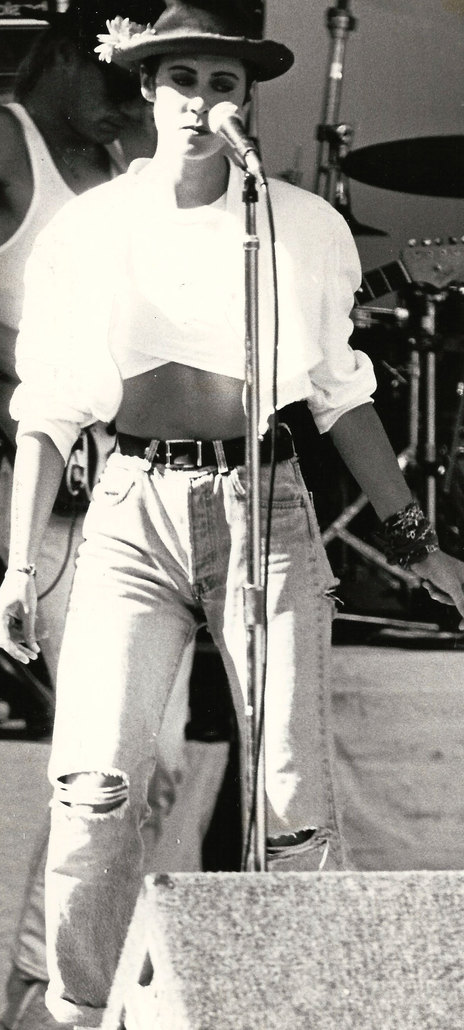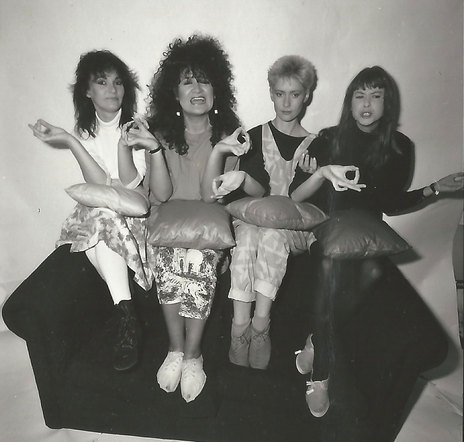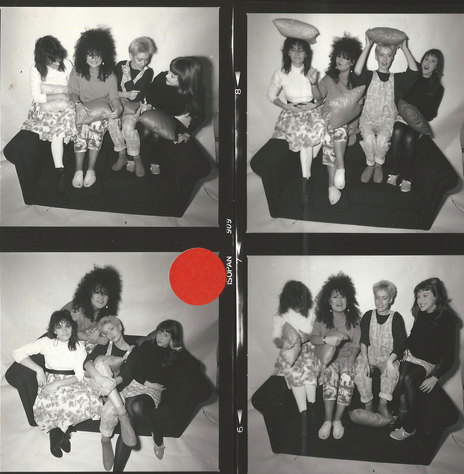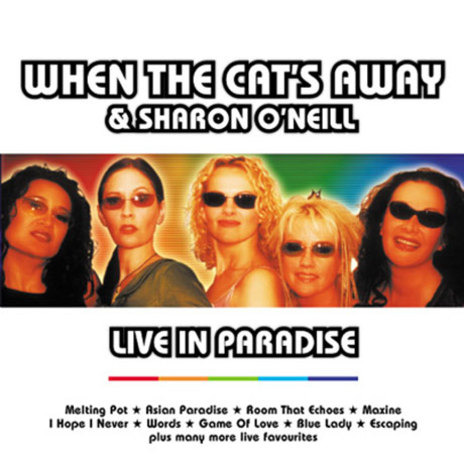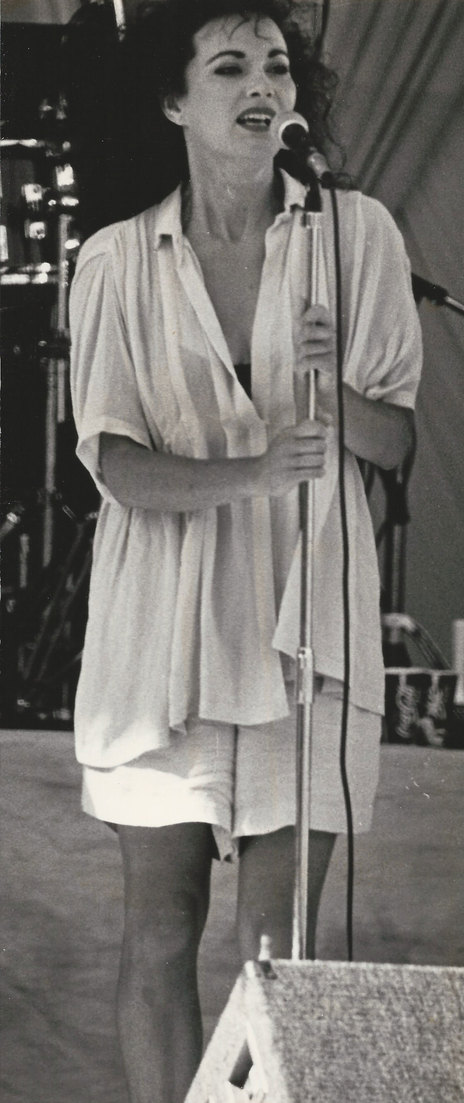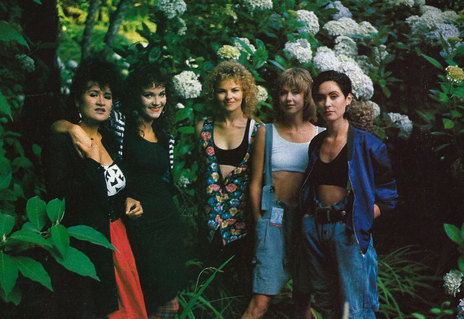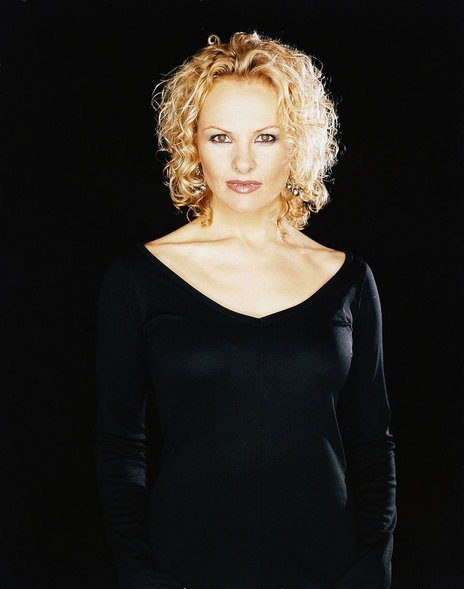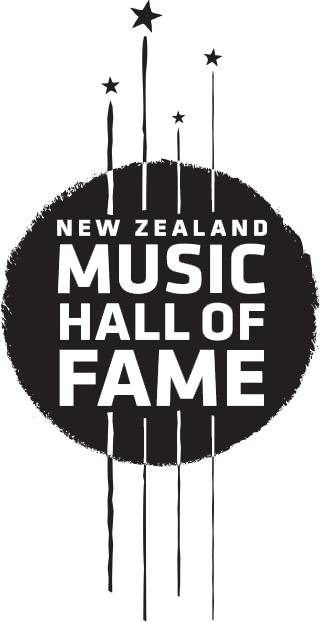If there was a ringleader among the women it was Debbie Harwood, who was mortified when names such as “Ladies Bring a Plate” or “The Money or the Bags” were suggested for their new enterprise. “I went to sleep that night and woke up with a start, with the name ‘When The Cat’s Away’,” Harwood recalled in 2015. The new suggestion was not an easy sell to the other four women. “We were a very strong-minded bunch.”
1985 New Zealand Music Awards
Four of the singers were finalists or presenters at the 1985 New Zealand Music Awards in Wellington. The next day, Chris Bourke – then at the NZ Listener – suggested the magazine do a story on the four young female contenders, who stole the show. The magazine got Annie Crummer, Debbie Harwood, Dianne Swann, and Margaret Urlich together for a photo-session by John Reynolds, and the story was written by staff writer Douglas Jenkin.
Margaret Urlich was then in Peking Man and won Best Female Vocalist. Dianne Swann was nominated for Most Promising Female Vocalist as the vocalist in Everything That Flies but Debbie Harwood won the category with her debut single ‘If That’ll Make You Happy’. The Single of the Year was won by Netherworld Dancing Toys with ‘For Today’, which featured Annie Crummer’s remarkable vocal.
Some of the young women were already friends, but some met for the first time at the Awards. At a dinner at her Devonport home in 1986, Debbie Harwood suggested the idea of performing as a group. “I asked Annie and Margaret first,” said Harwood. “Margaret wanted to bring Dianne along and then I thought an odd number would be better so we threw a few ideas around. Annie and I had worked with Kim Willoughby and we thought she would be a nice balance with her pop voice, so Kim it was. The five of us were there from the first show."
In May 1987 Harwood told Rip It Up writer Chris Bourke, “The Cats is a break from getting our own stuff played, recorded and on the radio. It’s ‘the girls go out to play’ … we’re only there to have fun really – there are no serious messages, just singing our favourites.”
In 2004 Dianne Swann reflected on their start: “The idea formed to get together, have some fun and sing a bunch of songs that we like, learn some harmonies. I don’t think anybody pictured it as being as popular as it became.” (Musical Chairs, RNZ)
Harwood reflected on the initial process, “We went to Annie’s house for a week, and it all fell into place. She has a great ear for harmonies and picked out the harmonies we were each most comfortable with.”
If there was serious content in the show it was the healthy dose of local songs including ‘Gutter Black’ (Hello Sailor), ‘Counting The Beat’ (The Swingers), ‘Be Mine Tonight’ (Th’ Dudes), ‘Bold As Brass’ (Split Enz), ‘Dragons And Demons’ (Herbs) and ‘Shark Attack’ (Split Enz).
1986 the Wildlife connection
When The Cat’s Away debuted at Auckland venue Wildlife – in Quay St, upstairs in the old Union Steamship Building – playing three nights in September 1986.
Harwood recalled how this came about: “I guested with the Wildlife resident band, The Skin Divers, and their bassist Allan Badger said to me ‘bring some of your friends along next time’. That was the catalyst for me. This was in September 1986. Jim Rowe was their lighting guy and got wind of this and booked the first Wildlife shows (and a show in Hamilton at the Roxoff). We were unmanageable in a sense because I had very strong ideas of how it was all going to work. I’d booked tours for five years at this point.”
The word got around quickly. By late 1986 the cats played at Auckland’s top venue, the Gluepot.
“When the idea was forming the Skin Divers asked me for a 60/40 split of the door in their favour,” said Harwood, “which just wasn’t fair in my opinion. I went back and offered them 50/50 split with us and they turned that down. So we found another collection of fantastic musicians: Ross McDermott (bass) and Steve Larkins (keyboards) came up from Christchurch plus Wayne Bell from Swann's band Everything That Flies (drums), Brett Adams from The Mockers (guitar), Jay Foulkes from Peking Man (percussion) and the Newton Hoons – Michael Russell (trumpet) and Chris Green (saxophone).”
The word got around quickly and When The Cat’s Away toured in late 1986 they played at a much larger Auckland venue, the Gluepot Hotel in Ponsonby.
1987 the live album
Debbie Harwood was working at Harlequin Studios, Albert Street, Auckland in the early days of When The Cat’s Away. The studio owner Doug Rogers did a deal with CBS Records for two singles and a live album.
Despite all the talk of fun, the show they toured in 1987 was a lengthy two-and-a-half hours long, and the singers had put the work into rehearsals. They started a 30-date tour early May that included 10 nights at His Majesty’s Theatre, Auckland, with Limbs, Topp Twins and Tim Woon, starting May 14. They ended the month in Christchurch before starting June in Timaru, Invercargill and Dunedin (two nights) and flying to Auckland to end the first week of June with Friday and Saturday at The Gluepot and Sunday June 7 at Wildlife.
The album was recorded in May at His Majesty’s Theatre with Elton John’s longtime soundman Clive Franks on the desk and mixed by Doug Rogers at Harlequin Studios. The album was released in June, achieved gold sales accreditation, peaked at No.39 on the NZ Album Chart, and charted for seven weeks.
The Cats and the All Blacks
In late 1987 the group were approached by TVNZ to shoot an on-the-road documentary for screening in prime time on TV One. Director Alan Thurston captured the raw, live energy of the group (with iconic All Blacks in the crowd) as they performed songs such as Labelle’s ‘Lady Marmalade’, Prince’s ‘Let’s Go Crazy’, Joan Jett’s ‘I Love Rock & Roll’, The Commodores’ ‘Sanctified’, The Small Faces’ ‘Itchycoo Park’, and The Beatles’ ‘Got To Get You Into My Life’. If you liked the set list, it was hard not to love the show. All five singers individually showed their vocal power with Annie Crummer excelling on ‘Lady Marmalade’ and Margaret Urlich delivering a very funky ‘Sanctified’, the group’s 1987 single.
The TV doco was filmed on the May 1987 tour, mostly at Pips Nightclub in Whangarei, but also at the Gluepot. The group regularly packed 1200 fans into their Gluepot shows but at Pips, Saturday 9 May 1987, due to the Fire Service keeping an eye on the venue, the legal limit of 450 had to be observed. Debbie Harwood’s brother Grant was on the door and those who could not get in did not want to go home. The All Black trials for the inaugural 1987 World Cup were also in Whangarei and the squad was named that night.
Debbie Harwood recalls the evening: “The owner of the club came down and said that the All Blacks were coming to the club and to let them in for free. Grant said ‘no’. The door was our money, our income and there were 150 people lined up outside with $10 in their pockets and if the All Blacks came in they would have to pay. Grant stood on the first step so he could look Gary Whetton, Steve McDowall and Sean Fitzpatrick in the eye and said ‘that’ll be $10, gentlemen’. He was terrified. These three refused to pay and Grant tried to explain that it was how we got paid etc. John Kirwan was really resistant. Then Captain [David] Kirk arrived and Grant explained to him that it wasn’t fair that the public were not allowed to pay to get in and the All Blacks could just waltz in for free. Kirk went back and spoke to the whole team and trialists and all of them filed in and paid their $10. Me old mate Fitzy missed out. Years later Grant mentioned it to Steve McDowall and he remembered and he apologised and said ‘we thought our shit didn’t stink back then – I’m sorry mate’.”
The documentary was not what TVNZ wanted on TV One and they moved it to a late night slot in December on TV2 where it rated well and won Documentary of the Year at the 1988 Film and Television Awards.
1988 Melting Pot
With a need for a single to promote their upcoming 1988/1989 summer tour, Debbie Harwood came up with the song ‘Melting Pot’.
“Blue Mink’s ‘Melting Pot’ was the first single I ever owned,” said Harwood. “I loved it. I wanted to record it myself for years and absolutely felt that it would be a huge hit with the women. I managed to get their enthusiasm for it, but it wasn’t that easy, to be honest. I felt it in my gut though.”
“ ‘Melting Pot’ did end up defining us, but really it was to advertise our tour”
– Debbie Harwood
“I recorded songs to help market our tours,” said Harwood. “I saw the band as a live touring act but being a waitress at 25 with no money I had to think smart! If we could record great tracks then radio might play them and give us three minutes of free advertising. The songs were marketing tools, they were never meant to define us. ‘Melting Pot’ did end up defining us, but really it was to advertise our tour.
“Late 1988 I approached CBS to record ‘Melting Pot’. They told me that it wouldn’t work but because they ‘liked me’, if I brought them a recording they would put it in the shops for me. So, we paid for the recording of ‘Melting Pot’ and the making of the video ourselves and I took it back to CBS. It was released and it went to No.1.”
The song entered the charts November 11, 1988 and stayed there for 15 weeks. The video was filmed at Airforce Recording Studios in Auckland's Eden Terrace, and at various locations such as Karangahape Road. The director was Kerry Brown, a photographer whose music images were frequently seen in Rip It Up magazine.
Gilbert Egdell, who signed Peking Man to CBS, left the company at the end of 1986 and managed Margaret Urlich after she left Peking Man. Egdell knew from experience how hard it was to get local music on the radio in the 1980s. I asked whether it helped that ‘Melting Pot’ was a cover. “Absolutely,” he replied. “It had been a No.1 single for Blue Mink. It was a no-brainer. It rocketed up the chart. It was well produced. I got Annie to produce it. I still think she has great production skills. She didn’t want to produce it.”
The big tour
The six-week “Melting Pot” tour in the summer of 1988/1989 saw When The Cat’s Away play to nearly 100,000 people. The urban myth is that following the tour, they all purchased houses. In 2015 Debbie Harwood was keen to refute that idea: “Three of us were able to put deposits on fairly cheap houses. I had a huge mortgage. No houses were bought outright, but it may have appeared that way from the outside.”
This summer tour was the victory lap of New Zealand after the chart success of ‘Melting Pot’ but it was a rough ride for Debbie Harwood, who had nodules removed from her throat nine days before the tour and asthma issues during the tour, leading to several hospital visits.
When the group left the stage after their late January performance at popular Northland summer venue the Tutukaka Hotel, all was not well. Debbie recalls, “We could hear fighting out the back and we were ushered by our crew into the semi-trailer that was behind the stage. We could hear and feel bodies bashing against the truck. Some gang members had tried to break into our rooms while we were on stage. Security caught them and the fighting ensued. It was vicious – one guy lost an eye from a bottle. The police were 40 minutes away in Whangarei so it took a while to calm down.”
The tour’s encore joke meant that they were inappropriately dressed for a riot. “We were cowering in the semi-trailer dressed in our nighties with cold cream on our faces,” said Debbie Harwood.
The massive tour had many production errors, leading to $60,000 of unbudgeted costs. Mistakes included staging trucks being left outside for a week in Jellie Park (Christchurch) and a tour truck on the wrong road hitting a low bridge.
The clash
The group had asked Gilbert Egdell in to oversee the finances on two tours including the summer of 1988/1989. Egdell was keen to participate to ensure there was no clash with Margaret Urlich’s solo career. Graeme Nesbitt, who had worked with Jenny Morris in Wide Mouthed Frogs, had approached the group with big plans, but the members were not looking for big plans that might clash with their own solo careers.
“‘Melting Pot’ was released in Australia by CBS and charted,” Egdell recalled in 2015. “Internationally we got a lot of interest in When The Cat’s Away: ‘We want this group!’ But CBS wanted When The Cat’s Away or Margaret Urlich solo, not both. The record company viewed it as one or the other.” Urlich’s solo career was already a work in progress, so inevitably her solo career took priority.
CBS Records in Australia were financing Urlich’s debut solo album and they were opposed to her touring with When The Cat’s Away. “But Margaret would go with the flow,” said Egdell, “and definitely wanted to hang out with her friends. My view was ‘you can do both’ because the tours were making her a lot of money, which she needed to help fund her solo career.”
Annie Crummer sang ‘Guilty’ with When The Cat’s Away, but Warner Music wanted the Dave Dobbyn song for her debut album, which was also a work in progress as the now-famous five sold out venues nationwide.
The big clash would come with the 1989 New Zealand Music Awards. When The Cat’s Away won Best Group but ‘Melting Pot’ was not a finalist for Best Single. Margaret Urlich won the category with ‘Escaping’; she also won Album of the Year with Safety in Numbers and Best Female Vocalist.
“We were very proud of ‘Melting Pot’ but for some reason CBS didn’t nominate it as Single Of The Year,” said Harwood, “because they thought we already had enough fuss made of us.”
1989/1990 ‘Free Ride’ Tour
After the production issues of the previous summer tour, the group asked experienced promoter Ian Magan to do their 1989/1990 tour. This three-week tour was the last with the original five singers. The aptly titled tour single ‘Free Ride’ was released in January 1990 and reached No.12 on its six week run on the NZ Singles Chart.
The 1990 Commonwealth Games were held in Auckland from January 24 to February 3. When The Cat’s Away played the Games after-party from midnight to 2.30am. Not in attendance at the after party, but in town for the Games, was Queen Elizabeth, the reigning monarch.
Now known for their punishing tour schedules, the next gig for When The Cat’s Away was after the after-party, a few hours later at Holy Trinity Cathedral in Parnell, with our reigning monarch. At the time, Debbie Harwood was nine-months pregnant: “I had a couple of hours sleep and then went off to church to sing for the Queen. We had not had a rehearsal at all. We were standing in front of Her Majesty, winging it.”
The hiatus
In 1991, Dianne Swann headed for London and Annie Crummer and Margaret Urlich focused on their solo careers. When it came time to put the group together again for the new millennium, Dianne Swann chose not to participate in the 2001 reunion tour. In 2004 she spoke to Radio New Zealand’s Musical Chairs: “When I hear ‘Melting Pot’ there are lots of different emotions that come up. At the beginning of When the Cat’s Away I had a great time, it was all so easy, it was hilarious, we had lots of costume changes, there was comedy involved. There was laughing all the time. I think we put on a really good show because it was really raw, really energetic and hilarious. As time went on the whole thing got smoothed out, it got a lot more cabaret. The other side of me thought, ‘I shouldn’t like this. I shouldn’t be doing this’. When I hear ‘Melting Pot’ I remember how amazing it was and how popular it was but I remember those feelings as well. A classic misfit.”
2001 On The Road Again
When The Cat’s Away returned to New Zealand stages in 2001 without Dianne Swann in the line-up. The tour was once again promoted by Ian Magan. After recording ‘Asian Paradise’ as a new single with producer Ian Morris, they wisely asked Sharon O’Neill to guest on the tour, as O’Neill had been absent from these shores for far too long. The pre-tour single reached No.16 on the New Zealand Singles Chart.
When the tour played Christchurch, their arrival was overshadowed by the news of the hijacked planes hitting the World Trade Centre. I had a deadline to write a feature on Sharon O’Neill’s career for Real Groove magazine and the day after 9/11, I spoke to her on the phone. She was not enjoying the events on CNN but she was enjoying the tour: “It’s so nice to be on the When The Cat’s Away tour and do these old songs and hear that people remember them and love them.”
After O’Neill’s absence for so many years, the show was a must-see when the tour played three nights at the Aotea Centre in Auckland. I enjoyed the show and, like many others, I was shocked by the negative review that appeared in the NZ Herald on October 3, 2001. I was there to see Sharon O’Neill but on the night all the singers delivered fine performances. The NZ Herald review was full of well-rehearsed clichés like: “A pub band at heart, the Cats pumped out the crowd-pleasers, took the money and ran.”
The tour was recorded for their 2001 live album Live In Paradise. They shared the artist billing with Sharon O'Neill, who performed ‘Words’, ‘Maxine’ and ‘Danced In The Fire’. Margaret Urlich was on lead vocals for two songs from her own career, ‘Room That Echoes’ and ‘Escaping’. The group romped through oldies from earlier tours including ‘Lady Marmalade’, ‘It's Raining Men’ and ‘Melting Pot’. They also revisited New Zealand hits ‘Game Of Love’, ‘Yesterday Was Just The Beginning Of My Life’, ‘Thru The Southern Moonlight’, ‘What's The Time Mr Wolf?’, ‘Asian Paradise’, ‘I Hope I Never’ and ‘Blue Lady’. The album, on Debbie Harwood’s Peach Records label via EMI Records, peaked at No.7 on the New Zealand Album Charts and sold platinum.
In February 2002, working with promoter Ian Magan, the group toured with Sharon O’Neill and her husband Alan Mansfield and former Split Enz members Eddie Rayner and Noel Crombie. The tour costs were approximately half a million dollars and the tour did not break even, a first for When The Cat’s Away.
In 2021, the NZ Music Hall of Fame/Te Whare Taonga Pūoro o Aotearoa inducted When The Cat’s Away. The aim was not only to recognise the impact of the group itself, but also the incredible contribution that each of the individual members made to the local music scene.
Sadly, in early 2020 Margaret was diagnosed with cancer, and passed away on 22 August 2022, age 57.
–
The following musicians played with When The Cat's Away:
Brett Adams - guitar
Steve Larkins - keyboards
Ross McDermott - bass
Michael Russell - trumpet
Chris Green - saxophone
Jay Foulkes - percussion
Wayne Bell - drums
Gary Verberne - guitar
